Deckard - Interview
by John Clarkson
published: 17 / 5 / 2004
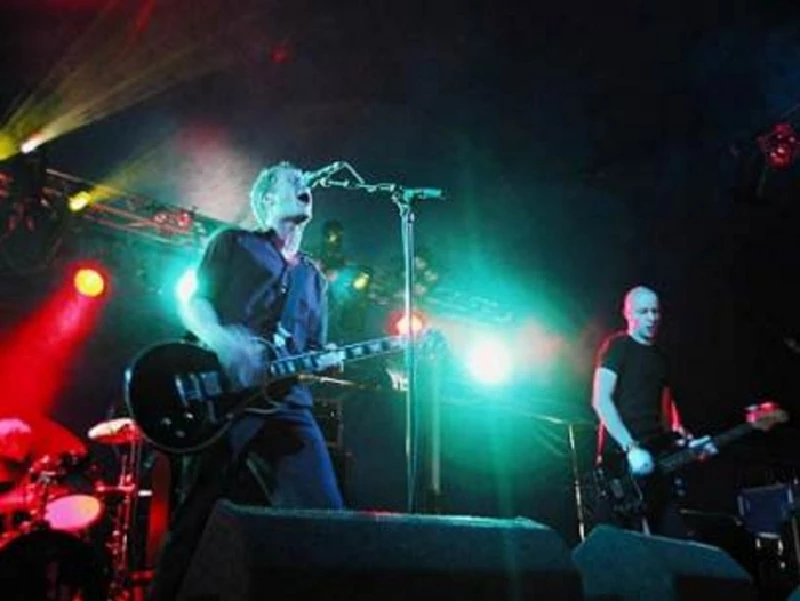
intro
Scottish guitar rock band Deckard have put out their new album, 'Dreams of Divinity and Dynamite', on their own label. After a decade of being signed to majors with various bands, frontman Chris Gordon talks about why they have taken this step
It is the aspiration of many a rising band to sign a major label contract. Yet even for those few groups who do manage to break out of the pub and small club circuit, and to win the prize of a big label record deal there is still no guarantee of a happy outcome. Sometimes, of course, a band, no matter how hard a record company may choose to push them, will still fail to attract the interest of the public at large. All too often, however, a change of management or a sudden swing of mood at a record label can doom a group as quickly as an initial deal might have invested it with hope. To Chris Gordon, the frontman wth Deckard, this has happened not just once, but three times. “It is the sort of thing that goes on in the major label record industry all the time” he says, with a wry laugh, talking to Pennyblackmusic. “There’s all these bands that you never hear of again whom that has happened to. With Deckard, it’s been quite persistent and just kept on going. There are so many bands though who just disappear. When we were signed to Reprise there were these two groups who were brand new signings and I have never heard of either of them since.” Chris Gordon comes from Stewarton, a small former colliery town twenty miles south west of Glasgow, and formed his first professional band, Baby Chaos, a metal outfit, in early 1993. He and guitarist Grant McFarlane have known each other since nursery school. The band’s bassist, Bobby Dunn, and drummer, Davy Greenwood, were also local lads. Baby Chaos soon developed a reputation for relentless hard touring, and in August of that year this was rewarded when they signed a contract with East West, a British offshoot of Warner Brothers. Baby Chaos continued to tour hectically, playing both headline shows and also support slots to the likes of Elastica, Terrorvision, Shed 7 and the Wildhearts. In 1994, they played almost 130 gigs in the UK. The group released their first album, ‘Safe Sex, Designer Drugs and the Death of Rock ‘n’ Roll’, that year, and followed this with their second album, ‘Love Your Self Abuse’,in 1996. A promo video for ‘Hello, Victim’, the single from Love Your Self Abuse’, which showed Gordon nude in the bath and which also featured ‘Trainspotting’ actress Kelly MacDonald, won them some notoriety. Yet, just as it seemed they might break through into the international arena, their A & R man at East West moved jobs to another company and the label lost interest. The latter part of 1996 was a bad time for Baby Chaos. Davy Greenwood, who had suffered from a minor heart condition since he was a child , had been dogged by ill-health since collapsing on stage the year before during the band’s first American tour, and, exhausted by touring, decided to leave the group. He was replaced by Gen Matthews, the former drummer with London-based punk-pop and chart act Jesus Jones. The group shortly afterwards lost its deal with East West. For a short while their future looked uncertain, but then they were offered another deal, this time with Reprise, a large American label. “We spent about six months in limbo” Gordon recalls. “And we were thinking ‘Okay ! What do we do ? Do we keep going and try to get another deal in the UK or do we concentrate on trying to get a deal in America ?' Then some of the management people at Reprise, which is ironically one of the American subsiduaries of Warner Brothers, started showing an interest, so we ended up signing with them.” “The management guys in America were very keen that we should choose a new name, and to make a completely fresh start. Our music by that stage was beginning to move in a different direction and had become more mellow, and so it made sense to us as well to go for a new title.” The band spent some time working under the moniker of Callahan,naming themselves in homage to Clint Eastwood’s Harry Callahan character in his ‘Dirty Harry’ series of films. When they discovered there was another group in Chicago with the similar name of Callaghan, they changed their title again, and, keeping the cinematic connection, took the new name of Deckard, calling themselves this time after Harrison Ford’s robot-hunting assassin in ‘Blade Runner’. An album, ‘Stereodreamscene’ was recorded in Los Angeles and came out in 2001. It was less bullish in tone than either of the Baby Chaos albums, and, more pop than metal-orientated, flavoured the band’s epic guitars with an orchestral, textural sound. By the time it was released, however, in what by now had become a depressingly familiar pattern, the personal at Reprise, who had originally signed the band, had nearly all moved on. It was given an American release only and received little promotion. With most of Deckard and Baby Chaos’ former fanbase still in Britain, it sunk almost without trace. The deal with Reprise fell apart shortly afterwards. With Deckard having gone into temporary hiatus, Chris Gordon had a third and final crack at fame with a new project, Regency Buck, after he became involved in making music with two friends in Glasgow, synthesiser player Dave McLean and guitarist Paul Westwater. “Dave and Paul had put all this music together, and I went over and put a few vocals on it” Gordon says. “That was literally my involvement. It was just a day’s work. We sent it off though to Nathan McGough, Baby Chaos' old A & R guy at East West, and he managed to make something happen and we ended up signing a 100 grand publishing deal and a month after that a deal with Dreamworks for stupid amounts of money.” Dreamworks is Hollywood-based and is the film, television, software and record company of the film director Steven Spielberg and music mogul David Geffen. Regency Buck , whom were described favourably at the time by the Guardian newspaper as merging “a hefty dose of Marilyn Manson metal...with head-nodding disco and improbably dance beats”, played a brief flurry of dates across Britain with Gordon enlisted into the line-up as their regular frontman. When these shows did less well than was expected, they were, however, almost immediately dropped by Dreamworks. An album, ‘Incoming’, emerged on the British independent label, B-Unique, in 2001. The Dreamworks version of the record, ‘Deliverance’, despite being mastered and having almost exactly the same tracks, was, however, never released. The group, which had never been originally planned as a permanent partnership, broke up soon afterwards. “The only blessing about dealing with the majors is that you usually don’t have to pay them a penny back” Gordon says, talking philosphically in conclusion about his years with them. “They offer you hundreds of thousands, but if it goes tits up you don’t owe them a thing. In all other ways though it is a shitty deal." By 2002, Deckard had reconvened and had begun work on their second album, ‘Dreams of Divinity and Dynamite’. Made over a two year period and released finally in May, it was recorded with an entirely different criteria to any of Chris Gordon and the rest of Deckard’s previous records. Gordon, who has worked recently with up-and-coming Scottish bands Terra Diablo and Dead Fly Buchowski, has sculptured out a career for himself as a producer. The other three members of Deckard also have alternative incomes. Rather than look for another big label to release their album , and to rely on them for wages, they, therefore, decided to put ‘Dreams of Divinity and Dynamite’ out as the first release of their own Deckard label. The album, with the exception of Gen Matthews’ drums which were recorded in the band’s rehearsal room in Glasgow, was recorded entirely in different members of the band’s houses. “The only reason we are doing this now is because we love each other and the music we are doing” Gordon enthuses. “There were maybe occasions in the past when the latter was not completely true” he admits. “There were a lot of outside influences coming to bear on the music. At the time we were philosphical about it and we thought 'If that is the way it is, let’s just get on with it.' Now though we are making music exactly the way we want to, and there’s nobody telling us otherwise.” 'Dreams of Dynamite and Divinity’ is undoubtedly the album of the band’s career. A big record with a big sound, its ten tracks are segued one into the other, breathlessly without pause. Surging guitars and drums are whipped up together to create a symphonic, grandiose storm. Many of Gordon’s gutsy, personal vocals tell of the break-up of a relationship, but, unlike Radiohead and Muse with whom they are sometimes compared, and with whom they share a similar epicness, Deckard’s music on ‘Dreams of Dynamite and Divinity’ has such an exuberance that ,despite its subject matter, it is curiously life-affirming. The last track on the album, the brazen ‘I Dream of Dynamite’, confirms this and finds Gordon down on his luck, but, like his band, refusing to be counted out and points towards hopeful new beginnings. “It was always our aim to make ‘Dreams of Divinity and Dynamite’ sound optimistic” reflects Gordon, when asked about this. “I am 32 now and have come to a lot of understandings about things that I didn’t have at all in my mid 20’s when I was just scraping around looking for I didn’t know what. I wasn’t a very happy guy then at all. You only to have look at the title of the Baby Chaos album ‘Love Your Self Abuse’ to see what our influences were then.” “We were playing that song again recently, and I was listening to those lyrics and thinking ’Jesus!’. That’s the way I thought it was back then though. Escaping into drugs and booze was what it was all about. That was about as good as it got, Now though we’ve all found out that that that doesn’t have to be the case at all, and that you can move far beyond that. It was my intention. therefore, to shine whatever little light I have and to put it on the record.” Deckard have been promoting ’Dreams of Divinity and Dynamite’ by using their own national street team, and also by targeting college and university radio stations. “We don’t even have the budget that you would have on a decent indie label” says Gordon. “We didn’t just want to make a CD and to press up a couple of thousand copies so that we could say we had done it. We wanted to make a go of it, so we have national press, national radio and also regional press and radio people all over the country working on it. It is really diffiicult to promote bands, but we didn’t want to chuck it our there and send it to a few people and for it to remain unheard. We really wanted to send it to as many people as possible to hear it.” “We want to put a tour together for maybe later this year” he continues, talking about Deckard’s plans for the future. “As this is the first album that Deckard have released in the UK, the intention is to use it as a calling card . We then want to make another album ourselves. We will be doing that definitely next year , and then we will assess where we are at. We all really want though to keep going.” The friendships that Gordon has held on to in the band , some since childhood, have become of importance to him above all. “You kind of imagine your future back then and obviously it ends up nothing like you imagined it would be” he says in conclusion. “It’s been an interesting journey so far. We all still kick about together. Davy Greenwood from Baby Chaos also still hangs out with us . He’s got a family now, but we still see him regularly. It’s great to still know all of them, and still to be able to work with them.” For Chris Gordon making music has taken on new priorities and new terms
Picture Gallery:-
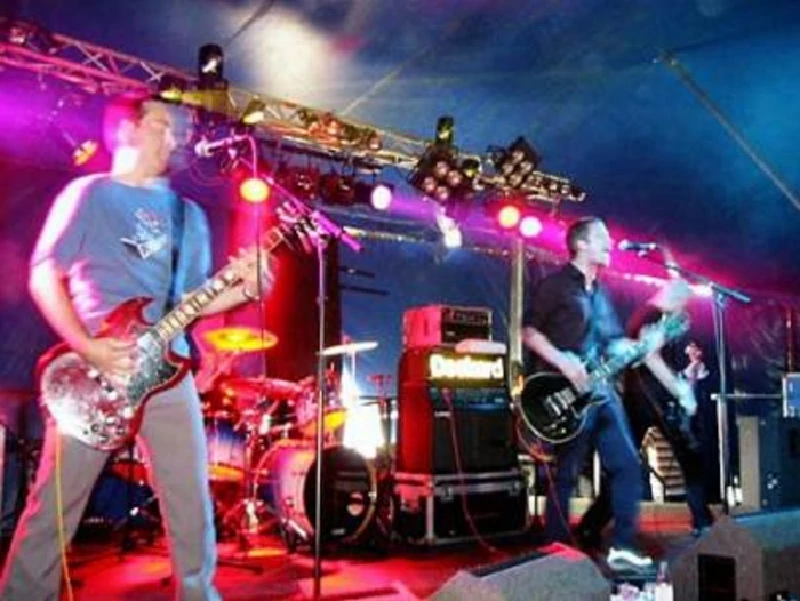
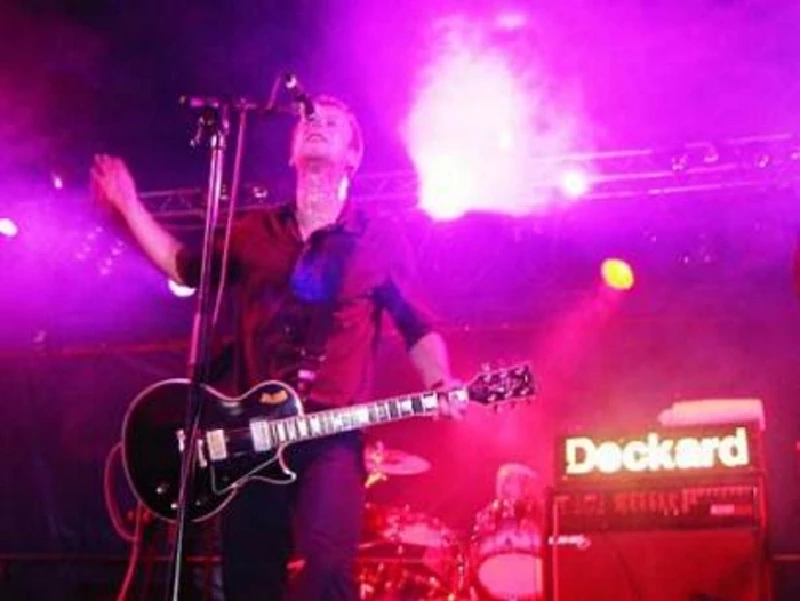
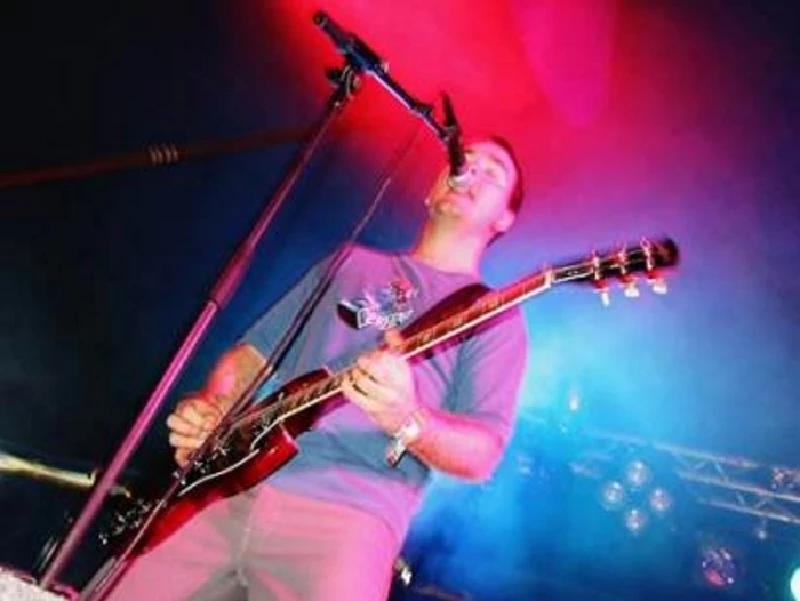
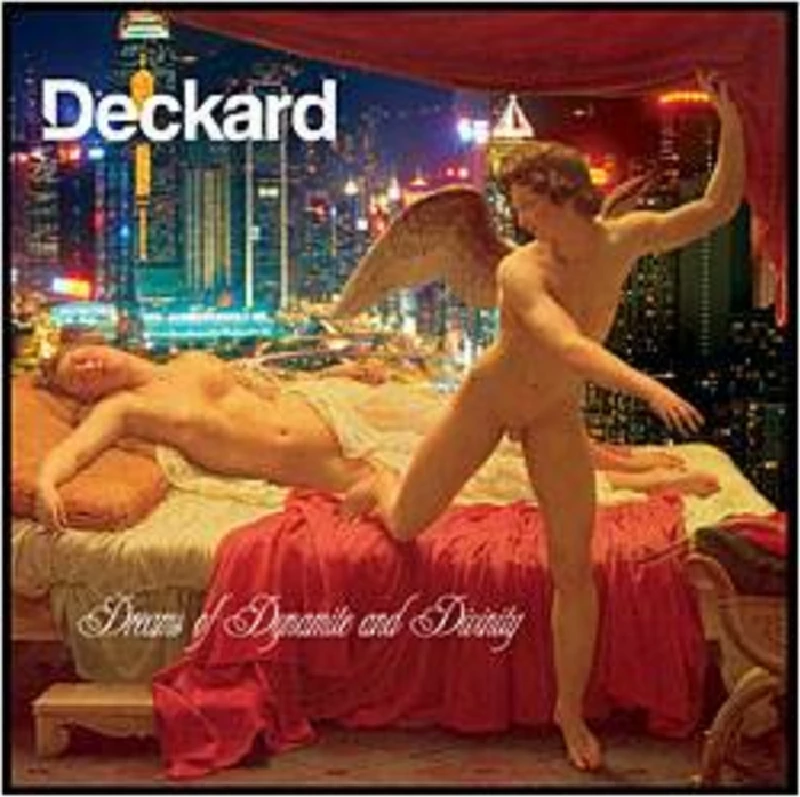
reviews |
|
Holy Rolling (2004) |
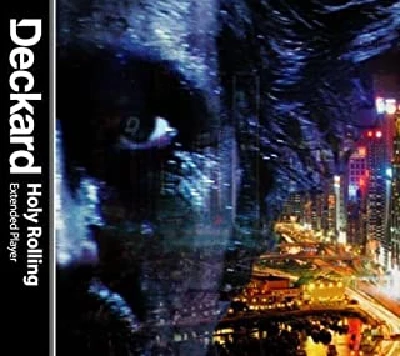
|
| Solid new seven song EP from Scottish guitar rockers Deckard, let down by a poor choice of title track |
| Dreams Of Dynamite And Divinity (2004) |
most viewed articles
current edition
Peter Doherty - Blackheath Halls, Blackheath and Palace Halls, Watford, 18/3/2025 and 21/3/2025Armory Show - Interview with Richard Jobson
Liz Mitchell - Interview
Deb Googe and Cara Tivey - Interview
Lauren Mayberry - Photoscapes
Max Bianco and the BlueHearts - Troubadour, London, 29/3/2025
Garfunkel and Garfunkel Jr. - Interview
Maarten Schiethart - Vinyl Stories
Clive Langer - Interview
Sukie Smith - Interview
previous editions
Heavenly - P.U.N.K. Girl EPBoomtown Rats - Ten Songs That Made Me Love....
Trudie Myerscough-Harris - Interview
Doris Brendel - Interview
Beautiful South - Ten Songs That Made Me Love...
Kay Russell - Interview with Kay Russell
Dwina Gibb - Interview
Pulp - Ten Songs That Made Me Love...
Barrie Barlow - Interview
Sound - Interview with Bi Marshall Part 1
most viewed reviews
current edition
Davey Woodward - Mumbo in the JumboNigel Stonier - Wolf Notes
Wings - Venus and Mars
Only Child - Holy Ghosts
Kate Daisy Grant and Nick Pynn - Songs For The Trees
Neil Campbell - The Turnaround
Philip Jeays - Victoria
Darkness - Dreams On Toast
Suzanne Vega - Flying With Angels
Charles Ellsworth - Cosmic Cannon Fodder
Pennyblackmusic Regular Contributors
Adrian Janes
Amanda J. Window
Andrew Twambley
Anthony Dhanendran
Benjamin Howarth
Cila Warncke
Daniel Cressey
Darren Aston
Dastardly
Dave Goodwin
Denzil Watson
Dominic B. Simpson
Eoghan Lyng
Fiona Hutchings
Harry Sherriff
Helen Tipping
Jamie Rowland
John Clarkson
Julie Cruickshank
Kimberly Bright
Lisa Torem
Maarten Schiethart